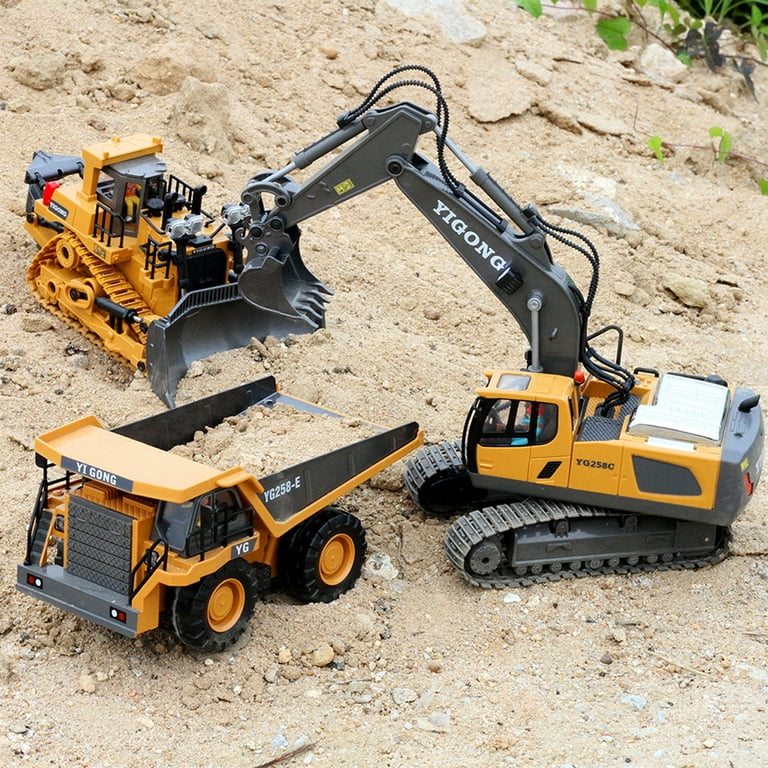Why a rc excavator Is Crucial for Safety and Precision in Construction Projects
Discover the Value of Excavator in Modern Building And Construction Projects
Excavators are vital tools in modern construction projects. Their versatility allows them to execute a variety of jobs, from excavating and grading to demolition and site prep work. Advanced functions, such as hydraulic accessories and general practitioners, improve their capabilities and efficiency on work websites. As the industry progresses, the importance of excavators grows much more. Comprehending their role can expose insights into the future of construction techniques. What lies ahead for these machines?
The Adaptability of Excavators in Different Projects
Excavators are usually linked with large-scale construction projects, their versatility enables them to be utilized in a large array of applications, from household landscaping to energy upkeep. In urban setups, excavators can navigate limited areas to dig foundations for homes or mount water drainage systems. Their ability to carry out fragile jobs makes them suitable for landscape design tasks, where they can excavate for fish ponds or plant trees. On top of that, excavators play a vital function in utility upkeep, effectively excavating trenches for pipes or cords without interfering with bordering locations. In agricultural applications, they aid in land clearing and soil prep work. Their versatility allows them to be geared up with various add-ons, enhancing their performance across various tasks. This diverse nature of excavators not just streamlines numerous building procedures yet also demonstrates their essential role in contemporary facilities development and upkeep.
Key Attributes and Kinds Of Excavators
The discussion on vital functions and types of excavators highlights the crucial qualities that make these equipments important in building and construction. Different excavator types, each developed for particular tasks, demonstrate their versatility and effectiveness across various applications. rc excavator. Comprehending these classifications and attributes is vital for optimizing their use in modern-day construction jobs
Excavator Enters Summary
Excavators play a critical function in modern-day construction, offering adaptability and efficiency across numerous tasks. These heavy equipment systems been available in several types, each tailored for specific applications. One of the most common kinds consist of spider excavators, known for their security on uneven surface, and rolled excavators, which offer greater flexibility on paved surfaces. Tiny excavators are favored for limited areas and small tasks, while long-reach excavators are designed for deep excavating. Additionally, there are customized excavators, such as hydraulic excavators, which boost power and accuracy. Each kind includes distinct abilities, making them necessary for jobs ranging from excavating and grading to demolition and product handling. Recognizing these variants allows building and construction professionals to choose the best excavator for their job requires.
Secret Includes Explained
Comprehending the essential functions of excavators enhances their reliable application in building jobs. Excavators are characterized by their powerful hydraulic systems, which give the required pressure for excavating, training, and relocating products. Their verbalized arms allow for a variety of movement, promoting exact operations in confined rooms. In addition, the variety of add-ons, such as buckets, grapples, and augers, expands their adaptability to fulfill different job needs. The size and weight of excavators also contribute to their stability and ability to move on numerous terrains. Furthermore, improvements in modern technology have brought about the integration of GPS and automation, enhancing precision and performance in excavation tasks. These attributes jointly position excavators as vital devices in contemporary building and construction.
Applications in Building and construction
Transforming building and construction sites, excavators play a crucial function throughout various applications, ranging from domestic structure jobs to massive facilities growths. These versatile machines are furnished for tasks such as digging foundations, trenching for utilities, and site grading. Various sorts of excavators, consisting of spider, rolled, and mini excavators, provide specific advantages tailored to the task requirements. Crawler excavators master rough terrains, while wheeled excavators provide wheelchair on smooth surface areas. Small excavators are optimal for constrained areas, making them prominent in metropolitan settings. The effectiveness and power of excavators significantly accelerate building and construction procedures, making certain prompt job completion. Their versatility better enhances their relevance, enabling building and construction groups to deal with a diverse variety of obstacles effectively.
Enhancing Efficiency and Productivity on Job Sites
Making best use of efficiency and efficiency on work sites is an important purpose in modern building and construction. Excavators play a pivotal function in attaining this goal by enhancing various jobs. Their ability to execute multiple functions-- such as training, grading, and excavating-- minimizes the need for added equipment, consequently saving time and resources.Moreover, excavators boost process by allowing for faster completion of tasks. With innovative features like hydraulic accessories and GPS modern technology, they can execute exact procedures that reduce mistakes and revamp. This precision not just boosts the high quality of work but additionally enhances product usage, adding to cost savings.The convenience of excavators allows them to adjust to different website conditions, guaranteeing that jobs advance smoothly no matter difficulties. By incorporating excavators into construction processes, teams can considerably increase their general productivity, resulting in timely task completion and increased productivity.
Security Advantages of Using Excavators
Excavators substantially boost safety on building and construction sites via boosted operator visibility and reduced manual work threats. By supplying drivers with a clear view of their surroundings, excavators aid to stop accidents and injuries. Furthermore, the equipment decreases the demand for employees to take part in hazardous hands-on tasks, better advertising a safer job atmosphere.
Enhanced Driver Presence
Building sites can be chaotic and filled with prospective risks, enhanced driver presence plays an essential role in ensuring security when making use of excavators. Modern excavators are designed over here with big, unhampered home windows and tactically put mirrors, permitting operators to preserve a clear view of their surroundings (rc excavator). This improved visibility is critical for detecting pedestrians, other equipment, and various obstacles, considerably lowering the threat of mishaps. Additionally, lots of excavators integrate innovative technology, such as electronic cameras and sensing units, to offer drivers with added perspectives, further enhancing recognition. The capability to see even more plainly not just help in reliable procedure however likewise cultivates a more secure workplace, making it less complicated for drivers to browse intricate building websites without jeopardizing safety requirements
Lowered Handbook Labor Risks
When hand-operated labor is minimized via making use of excavators, numerous safety advantages emerge, considerably enhancing the well-being of building and construction employees. Excavators reduce the physical pressure related to hefty lifting and repeated tasks, effectively decreasing the danger of bone and joint injuries. By automating processes such as digging, grading, and relocating products, they allow employees to maintain a more secure distance from prospective risks. Additionally, excavators are geared up with sophisticated security attributes, such as rollover defense systems and improved driver ergonomics, which even more safeguard personnel on site. The outcome is a considerable reduction in office crashes and injuries, causing boosted productivity and morale among building groups. Ultimately, the adoption of excavators adds to a safer and much more efficient construction atmosphere.
Excavators in Earthmoving and Site Preparation
In modern-day building, a significant section of earthmoving and website preparation jobs relies upon the effectiveness and versatility of excavators. These makers are made to manage various soil kinds and surface, making them crucial for rating, digging, and trenching tasks. Their hydraulic arms can be geared up with different add-ons, such as augers and containers, allowing operators to tailor their technique based upon particular task requirements.Excavators excel at relocating large quantities of planet swiftly and successfully, which increases the general building timeline. They can navigate limited areas and testing websites where traditional devices may battle, enhancing efficiency. Additionally, the precision of excavators assurances that site prep work follows strict specifications, lessening the threat of mistakes that can bring about expensive rework.
The Role of Excavators in Demolition Tasks
Excavators play an essential duty in demolition jobs, as they possess the power and agility needed to take down frameworks successfully. Equipped with numerous accessories such as hydraulic breakers, shears, and grapples, these equipments can adjust to various demolition requirements, whether for small structures or huge commercial sites. Their adaptability makes it possible for operators to tackle complex jobs while preserving security and precision.In addition to their demolition capacities, excavators assist in debris removal, ensuring that job websites stay orderly and risk-free. By damaging down structures right into convenient pieces, they enable for streamlined cleaning and recycling of products, aligning with contemporary sustainability efforts.Moreover, excavators can access limited rooms and browse irregular surface, making them more information crucial in city demolition projects. In general, their robust style and multifunctionality make excavators an important possession in the demolition phase of building, adding considerably to task timelines and effectiveness.


Future Patterns in Excavator Modern Technology and Use
As the building industry advances, advancements in excavator modern technology are poised to change their usage and effectiveness considerably. One considerable trend is the assimilation of automation and synthetic knowledge, enabling excavators to run with minimal human treatment. This change will enhance precision in jobs such as grading and trenching, lowering human error and enhancing productivity.Additionally, the surge of electric and hybrid excavators is forming an extra sustainable building environment, lowering carbon discharges and fuel prices. Enhanced telematics systems are also arising, allowing real-time tracking of equipment efficiency and maintenance needs, which can bring about much better functional performance and longer equipment lifespan.Moreover, innovations in attachment modern technology are broadening the flexibility of excavators, permitting them to perform a wider series of jobs. The mix of these fads demonstrates a future where excavators are smarter, greener, and much more versatile, ultimately improving construction job characteristics.
Frequently Asked Questions
Exactly How Do Excavators Compare to Various Other Building Machinery?
Excavators, identified by their flexibility and power, master excavating and earthmoving contrasted to various other machinery. Their capability to carry out numerous tasks, including lifting and demolition, makes them essential in building tasks, enhancing general use this link efficiency.

What Is the Ordinary Life Expectancy of an Excavator?
The ordinary life expectancy of an excavator generally varies from 7,000 to 10,000 operating hours, depending upon maintenance, use conditions, and version. Correct treatment can prolong this lifespan, ensuring peak performance throughout its functional years.
Just How Are Excavators Kept for Optimal Efficiency?
Excavators call for regular maintenance for peak performance, consisting of routine examinations, liquid checks, filter substitutes, and timely repairs. Implementing a preventative maintenance schedule aids lengthen their life-span and warranties reliable operation in numerous construction environments.
What Are the Expenses Associated With Renting vs. Purchasing an Excavator?
The prices connected with purchasing an excavator versus leasing differ substantially. Renting offers reduced upfront costs but can collect with time, while acquiring needs a considerable initial investment, however gives lasting cost savings and possession possession advantages.
What Training Is Called For to Run an Excavator?
Operating an excavator calls for specialized training, generally consisting of safety and security methods, machine operation methods, and ecological understanding. Accreditation programs commonly mandate useful experience, making it possible for drivers to handle numerous tasks effectively while guaranteeing compliance with industry laws. The most common kinds consist of crawler excavators, known for their stability on irregular surface, and wheeled excavators, which supply better flexibility on smooth surface areas. Mini excavators are preferred for limited spaces and small projects, while long-reach excavators are created for deep digging. Additionally, there are specific excavators, such as hydraulic excavators, which boost power and accuracy. Various types of excavators, consisting of crawler, rolled, and mini excavators, give particular advantages customized to the project needs. Spider excavators excel in harsh surfaces, while wheeled excavators provide mobility on paved surface areas.